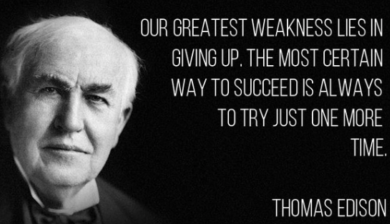The What, the Why, and the How of Success
If you are like most people, you want to be more successful—be that in your career, your recognition from others, or even your social network. Perhaps you are applying yourself such that you believe your journey of improvement is taking you towards your definition of success.
Becoming what you want requires evaluating the steps you need to take to realize your goals. It requires stepping outside your comfort zone. It also requires you to make investments in yourself. And, it requires a determined commitment on your part for which no amount of self-help books on success, inspirational speeches, or encouragement from others will compensate. In its purest form, commitment doesn’t require any of those things.
In order to get where you’re going, it helps to acknowledge what might deter you. I suggest taking a look at yourself from some other angles, you know, those “blind spots” that we all have trouble seeing. Don’t be fooled into believing that everything is fine or “under control.” As the saying goes, even if you’re on the right track you’ll still get run over if you stand still. Instead, let’s consider these three essential components that may help to shine a spotlight on those blind spots: ability, motivation, and attitude.
The What: Ability
Ability is the possession of a natural aptitude, whether physical or mental, in your power to perform. But possession does not automatically translate to the application of it. If you subscribe to the saying that there is greatness in all of us, the core of that greatness starts with the raw material that you must discover and from which that greatness will derive.
We often hear the phrase “find your passion.” Discovering your passion is the genesis, but it is only a starting point on your journey. Assuming that you have a clear grasp on what your passion is, it then has to ultimately be married to an innate ability that with further practice, training, and commitment will manifest the potential within you.
The Why: Motivation
Motivation is a force or condition of eagerness such that it causes you to act. Recognizing and acknowledging your ability is they key, turning that key in the ignition of your mind requires motivation. It has been said that there is no greater personal loss than having ability and doing nothing with it. With regards to the potential for personal achievement and fulfillment of your purpose here on earth goes, I agree.
Herein, though, lay a secret that is so often overlooked. I believe this could be what causes your motivation to live or die. The secret is the difference between having a self-serving motivation versus a motivation that seeks to serve others. Winston Churchill said “We make a living by what we get. But we make a life by what we give.” In my experience, for motivation to truly thrive, it must be directed toward the purpose of giving rather than getting.
The How: Attitude
Attitude is the Holy Grail, the ongoing culmination of your ability and motivation. It represents the feelings or frame of mind that determine your behavior. After all, no one can see your ability or your motivation. They see only your actions; they hear only your words. In effect, your behavior is your brand, and your brand reveals your destiny. If birthing motivation begins in your mind, then building the attitude that gives it life comes from your heart.
There are thousands of examples of people—celebrities and civilians—who made something of themselves by joining ability, motivation, and attitude to reach their definition of success. But even if we recognize them all as “professionals” in the sense of being at the top of their game, you must understand that what it took to get there will actually intensify in order to stay there.
In a nutshell, ability is what you are capable of doing, motivation determines what you do with it, and most importantly attitude determines how well you do it.
The greatest frontier of opportunity to achieve success, however you define it, exists in your mind. To become what you envision, there are no shortcuts. Start by examining whether or not you are capable of producing more than what you are presently accomplishing. As Mark Twain said, “There are a thousand excuses for failure, but never a good reason.”


 +17078510440
+17078510440 info@mikemuhney.com
info@mikemuhney.com




